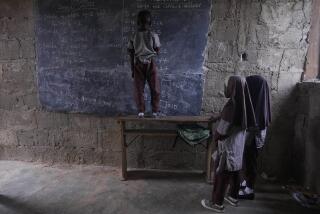Nigeria’s first oil well is still source of woe
- Share via
OIL WELL NO. 1, NIGERIA — Three decades after pumping its last drop, the first oil well in Nigeria is marked by a decrepit signboard bearing what would seem an uncontroversial statement:
Oloibiri Well No. 1, drilled June 1956, 12,008 feet.
But this well, its wellhead furred with rust, is at the center of an increasingly vitriolic feud between two villages over who owns the land it’s on. The conflict is fed by hope that soaring prices will tempt big business to squeeze more oil from the well and give a pittance to the village that owns the land.
The tussle between Oloibiri and Otabagi brings into relief the fact that villages sitting on the prodigious oil reserves in Nigeria, Africa’s biggest producer of crude, have barely profited from the booming industry. Corrupt officials have hoarded the government’s cut of profits, and energy firms have compensated locals with paltry payments, though enormous wealth is generated by drilling.
In both villages, children wander unclothed past heaps of burning trash. Oil spills have sullied the farmland and spoiled the water. Fields once crammed with ears of corn, and nets full of flapping fish, have become distant memories.
“After destroying the area without anything to give in return, we have stepped maybe 50 times backwards. Pollution, both air and water,” said Sunday Ikpesu, a 74-year-old Oloibiri chieftain. “We didn’t know crude oil was such a bad thing.”
Neither village would win a share of the revenue that might flow from Oil Well No. 1. The most they could expect from Royal Dutch Shell PLC, which owns the rights to the well, would be “community outreach” funds for building projects.
But in a nation where the government has regularly failed to provide citizens with health clinics, decent schools, piped water or electricity, the scraps that oil giants throw are considered better than nothing and are subject to fierce competition.
Firms such as Exxon Mobil Corp., Total SA and Chevron Corp. employ teams of community relations officers whose jobs include launching development projects worth tens of millions of dollars. No overall figures exist for the payments. But Shell, the country’s largest operator, says operations it runs contributed more than $110 million in 2007.
Rights campaigners say oil firms are sowing discord among villages and exploiting their desperation.
“The oil industry does not take time to find ways . . . to support a consensus-building process under which all communities come together and agree,” said Dimieari Von Kemedi, a local activist. The benefits they give are “laughable . . . compared with the amount of money that comes out of these oil wells.”
Shell didn’t comment on the village conflict and doesn’t publicly announce its operating plans. Oil industry workers vigorously defend the community payments, calling them charitable donations to needy people.
They also argue that oil companies can’t take over the long-term responsibilities of the Nigerian government, which claims the majority of the proceeds stemming from the oil industry.
Critics acknowledge that the oil firms have no legal obligation to provide services to Nigeria’s people. But they say the outreach efforts ignore the realities of the people they’re purportedly trying to help.
Schools are built, but no teachers are hired. Healthcare facilities have no long-term access to drugs. So-called “security” teams, hired to protect oil installations, are little more than youths bribed to not vandalize the gear, the activists say.
Perhaps most damaging has been the tendency to dole out benefits to the inhabitants closest to sensitive oil machinery, which has undermined community leadership plans and pitted people and communities against each other for the payments. Dozens of violent flare-ups can be attributed to conflict over oil company payments in recent years.
The feud over Nigeria’s first oil well is a typical illustration.
Already scuffles and heated arguments have been reported near the well. Villagers say they don’t feel welcome among their neighbors, even though they share farmland and river water used for drinking and cleaning.
Oloibiri and Otabagi have little money to launch a court battle. Any successful outcome probably would be through mediation by a headman of the traditional Ogbia kingdom, of which both towns are part, said Von Kemedi.
The truth may be lost forever in the conflicting tales surrounding ownership rights that have passed down since European oil explorers first arrived in southern Nigeria and gave villagers an idea of how valuable the earth underfoot could be.
That was as early as the 1930s, when Nigeria was a British colony governed by the “Native Administration” and Christian missionaries taught the few indigenous people who were given English-language instruction.
Traditional land-transfer practices differed from Western-style sales, from one sovereign party to another. Written records were rare, with leaders passing down history and community boundaries orally.
By the 1950s, Oloibiri boasted a postal exchange and an Anglican church run by English missionaries. It was the seat of operations for the exploration team of what would later become Royal Dutch Shell.
The explorers found what they were looking for in the 1950s. Sometime during that period, the Oloibiri villagers say, they signed a contract with some Shell employees giving them access to the area around what would become Well No. 1. They say this proves that the people of Oloibiri are the rightful owners. But no copies of the pact appear to exist.
In 1958, the first oil began to flow. Villagers here live only into their 40s on average, but the few still around remember a huge party.
The Shell team brought out long tables, they remember, and more European-style beer than anyone had ever seen.
“They made a heavy party that day,” recalls 60-year-old Edwin Ofonih of Oloibiri village. “Everyone drank until nonsense.”
Half a century later, the villagers live in poverty while oil giants have carted off the riches from beneath their feet and officials head overseas for healthcare and recreation.
More to Read
Sign up for Essential California
The most important California stories and recommendations in your inbox every morning.
You may occasionally receive promotional content from the Los Angeles Times.










